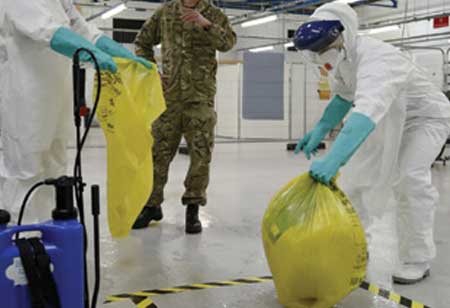Thank you for Subscribing to Healthcare Business Review Weekly Brief
Be first to read the latest tech news, Industry Leader's Insights, and CIO interviews of medium and large enterprises exclusively from Healthcare Business Review
How to Implement a Green Waste Management Strategy in Healthcare Facilities
A comprehensive green waste management strategy in healthcare involves waste audits, data analysis, source reduction, segregation, and staff training. This approach can significantly reduce environmental impact, comply with regulations

By
Healthcare Business Review | Wednesday, January 15, 2025
Stay ahead of the industry with exclusive feature stories on the top companies, expert insights and the latest news delivered straight to your inbox. Subscribe today.
A comprehensive green waste management strategy in healthcare involves waste audits, data analysis, source reduction, segregation, and staff training. This approach can significantly reduce environmental impact, comply with regulations, and contribute to a sustainable healthcare system.
FREMONT, CA: Environmental sustainability is gaining increasing significance across all sectors, including healthcare. Healthcare facilities inherently generate substantial waste, including infectious medical, general office, and food waste. Implementing an effective green waste management strategy within European healthcare settings is an ethical responsibility and a critical step toward reducing the sector’s ecological footprint.
A waste audit is an essential initial step that involves analysing generated waste volume, types, and disposal methods. Healthcare facilities in Europe must comply with various EU regulations, including the Waste Framework Directive (2008/98/EC), making conducting waste audits a critical component of regulatory compliance.
Comprehensive Strategies for Green Waste Management in Healthcare Facilities
Setting Clear Goals and Objectives
Establishing measurable goals is a foundational step toward effective waste management. After conducting a waste audit, healthcare facilities can define specific objectives, such as reducing total waste output by 20 per cent within five years, increasing recycling rates to 50 per cent within two years, and ensuring 100 per cent responsible treatment of medical waste. These targets provide a clear direction and framework for sustainable practices.
Implementing Waste Segregation at Source: Proper waste segregation is critical for efficient waste management. Healthcare facilities can adopt color-coded bins to distinguish between infectious waste, recyclables, and general trash. Staff training plays a pivotal role in ensuring waste is correctly sorted at the source, while partnerships with specialised waste management companies provide the safe handling of medical waste.
Reducing Medical Waste: Minimizing medical waste is essential for environmental and operational efficiency. Facilities can achieve this by transitioning to reusable surgical instruments, investing in on-site technologies for sterilising and recycling medical waste and optimising procurement processes to avoid over-ordering supplies.
Recycling and Responsible Disposal: Collaboration with local authorities and recycling services is vital to ensure non-contaminated waste is recycled. For example, plastics from non-medical items can be sent to recycling plants, and food waste can be composted or processed into biogas. These efforts align with the EU Circular Economy Action Plan, which promotes transforming waste into a resource rather than a liability.
Staff Training and Engagement: Effective waste management depends on the active participation of all staff members. Regular training sessions are essential to familiarise employees with waste management policies. Educational campaigns can foster eco-friendly behaviours, while incentive programs can encourage staff to propose and implement green solutions. Incorporating waste management into administrative reviews ensures continuous attention to sustainability goals.
Leveraging Technology: Advancements in technology can transform waste management practices in healthcare. Smart bins equipped with sensors optimise collection schedules by tracking fill levels, while waste analytics software provides insights into waste production patterns and identifies areas for improvement. Additionally, on-site waste treatment technologies, such as advanced sterilisation and compacting systems, can significantly reduce the volume and risk of medical waste.
Monitoring and Regular Evaluation: A sustainable waste management strategy requires ongoing monitoring and evaluation. Key performance indicators (KPIs) such as recycling rates, waste output reduction, and compliance with EU regulations should be tracked regularly. Annual assessments help identify challenges and drive continuous improvement, ensuring facilities remain aligned with their environmental objectives.
Healthcare facilities should collaborate with local governments, NGOs, and other relevant organisations to exchange best practices and remain informed about evolving regulations and emerging technologies. Such joint efforts typically result in more effective outcomes.
Healthcare facilities across Europe have a significant opportunity to lead in sustainability while enhancing the health and well-being of communities. By recognising the environmental impact of their waste, setting clear and actionable goals, promoting education, and utilising advanced technologies, these facilities can effectively implement green waste management strategies. This approach supports environmental objectives and ensures compliance with regulatory standards.






